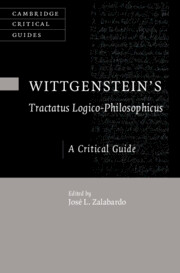Book contents
- Wittgenstein’s Tractatus Logico-Philosophicus
- Cambridge Critical Guides
- Wittgenstein’s Tractatus Logico-Philosophicus
- Copyright page
- Contents
- Contributors
- Introduction
- Chapter 1 Wittgenstein’s Impatient Reply to Russell
- Chapter 2 Modality in Wittgenstein’s Tractatus
- Chapter 3 Clarification and Analysis in the Tractatus
- Chapter 4 The Fish Tale: The Unity of Language and the World in Light of TLP 4.014
- Chapter 5 That Which ‘Is True’ Must Already Contain the Verb: Wittgenstein’s Rejection of Frege’s Separation of Judgment from Content
- Chapter 6 Solipsism and the Self
- Chapter 7 The Tractatus and the First Person
- Chapter 8 Arithmetic in the Tractatus Logico-Philosophicus
- Chapter 9 ‘Normal Connections’ and the Law of Causality
- Chapter 10 The Ethical Dimension of the Tractatus
- Chapter 11 “Obviously Wrong”: The Tractatus on Will and World
- References
- Index
- Cambridge Critical Guides
Chapter 11 - “Obviously Wrong”: The Tractatus on Will and World
Published online by Cambridge University Press: 07 March 2024
- Wittgenstein’s Tractatus Logico-Philosophicus
- Cambridge Critical Guides
- Wittgenstein’s Tractatus Logico-Philosophicus
- Copyright page
- Contents
- Contributors
- Introduction
- Chapter 1 Wittgenstein’s Impatient Reply to Russell
- Chapter 2 Modality in Wittgenstein’s Tractatus
- Chapter 3 Clarification and Analysis in the Tractatus
- Chapter 4 The Fish Tale: The Unity of Language and the World in Light of TLP 4.014
- Chapter 5 That Which ‘Is True’ Must Already Contain the Verb: Wittgenstein’s Rejection of Frege’s Separation of Judgment from Content
- Chapter 6 Solipsism and the Self
- Chapter 7 The Tractatus and the First Person
- Chapter 8 Arithmetic in the Tractatus Logico-Philosophicus
- Chapter 9 ‘Normal Connections’ and the Law of Causality
- Chapter 10 The Ethical Dimension of the Tractatus
- Chapter 11 “Obviously Wrong”: The Tractatus on Will and World
- References
- Index
- Cambridge Critical Guides
Summary
Elizabeth Anscombe has called the part of the Tractatus dealing with the relation between the will and the world “obviously wrong.” To understand and assess this view, I look at what Wittgenstein, Schopenhauer, and Anscombe say about the will. She is right to reject the view of the will that she calls wrong, but it is possible that Wittgenstein intends his readers to reject it too. Recent work by Anne-Marie Søndergaard Christensen, Eli Friedlander, Modesto Gómez-Alonso, and Michael Kremer helps us to see this, and to understand Wittgenstein’s views on ethics as well. The will, conceived as something distinct from our actions in the world, is indeed a chimaera, as Anscombe argues. Will belongs to what we do. And it is not, as such, something that we can or should reject. If we are to reject anything in this neighbourhood, it is idle wishing that the world would change.
- Type
- Chapter
- Information
- Wittgenstein's Tractatus Logico-PhilosophicusA Critical Guide, pp. 203 - 218Publisher: Cambridge University PressPrint publication year: 2024

